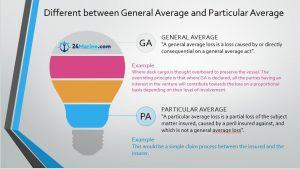In the intricate world of logistics, there exists a term that is both crucial and complex - Particular Average. This concept plays a vital role in the realm of transport and shipping, influencing everything from insurance claims to cost calculations. Join us as we delve into the nitty-gritty details of Particular Average and explore its impact on the logistics industry.
Understanding Particular Average in Shipping Contracts
When it comes to shipping contracts, understanding Particular Average is crucial for ensuring smooth logistics and transport operations. Particular Average refers to the partial loss or damage of cargo during transportation that is borne by the owner of the goods. This concept is essential in determining the responsibilities and liabilities of all parties involved in the shipping process.
Particular Average can have a significant impact on the financial aspects of a shipping contract, making it vital for both shippers and carriers to be well-versed in its implications. By having a clear understanding of Particular Average, parties can accurately assess risks, allocate costs, and ensure that proper insurance coverage is in place. Additionally, knowing how Particular Average is calculated and applied can help prevent disputes and streamline the claims process in case of any cargo damage or loss.

Key Factors Impacting Particular Average Claims in Logistics
When it comes to particular average claims in the realm of logistics, there are several key factors that can significantly impact the process. One of the main factors to consider is the mode of transport being used. Whether it’s by sea, air, or land, each mode of transport brings its own set of risks and potential for damage to goods. Additionally, the type of goods being transported plays a crucial role in determining the likelihood of particular average claims. Perishable items, fragile goods, or hazardous materials may be more susceptible to damage or loss during transit.
Another important factor that can impact particular average claims in logistics is the route taken by the shipment. Longer and more complex routes may increase the chances of encountering adverse weather conditions, accidents, or delays, all of which can lead to potential claims. Furthermore, the packaging and handling of the goods prior to and during transportation can also influence the likelihood of particular average claims. Properly secured and protected cargo is less likely to sustain damage compared to poorly packed or mishandled shipments.

Strategies to Mitigate Risks Associated with Particular Average
When it comes to mitigating risks associated with particular average in logistics, transport, and shipping, there are several strategies that can be implemented to protect against potential losses. One effective approach is to ensure that proper insurance coverage is in place for goods in transit. Having comprehensive marine cargo insurance can provide financial protection in the event of partial loss or damage to the goods during transport.
Another important strategy to mitigate risks associated with particular average is to carefully pack and secure cargo to prevent damage. Proper packaging and securing of cargo can help minimize the likelihood of goods being lost or damaged during transportation. Additionally, using reputable carriers and ensuring clear communication throughout the shipping process can also help reduce the risk of particular average incidents.

Best Practices for Efficient Handling of Particular Average Claims in Transport Operations
When it comes to handling particular average claims in transport operations, efficiency is key. To ensure smooth and hassle-free processes, there are several best practices that can be implemented:
- Document Everything: Keeping detailed records of all shipments, including bills of lading, invoices, and other relevant documentation, can help expedite the claims process.
- Communicate Effectively: Open lines of communication between all parties involved, including shippers, carriers, and insurers, can help prevent misunderstandings and streamline the claims process.
| Claim Type | Best Practice |
|---|---|
| Freight Damage | Conduct thorough inspections before and after transit. |
| Lost Shipments | Track shipments in real-time and report any discrepancies immediately. |
Concluding Remarks
As we conclude our exploration into Particular Average in logistics, transport, and shipping, we hope that you have gained a deeper understanding of this important concept in the industry. From its origins in maritime law to its practical implications for businesses today, Particular Average plays a crucial role in the world of transportation and shipping. Whether you are a seasoned professional or just starting out in the field, being aware of the nuances of Particular Average can help you navigate the complex terrain of logistics with confidence and expertise. Thank you for joining us on this journey through the intricacies of Particular Average. Stay tuned for more insights and analysis on the ever-evolving world of logistics and shipping.
